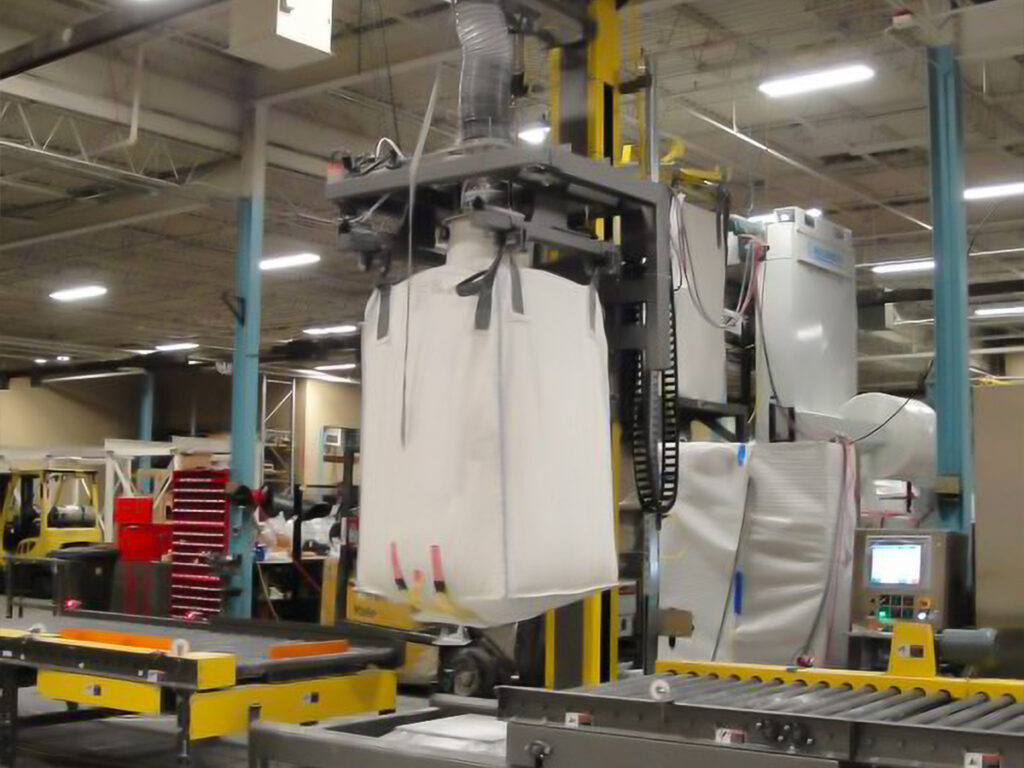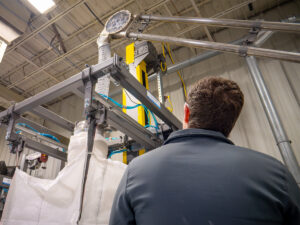Managing bulk bags effectively is critical for ensuring smooth operations, but problems like unstable bags, material blockages and inaccurate weighing can complicate things quickly. These challenges can have a ripple effect, interrupting your production flow and increasing operational costs.
In this blog, we’ll explore five of the most common bulk bag handling issues as reported by industry professionals in our 2024 State of Bulk Bag Handling report – and what you can do to start addressing them.
1. Material Contamination
Whether its external contaminants like dust, moisture and foreign particles or cross-contamination between different products, material contamination poses significant risks especially in industries with strict regulatory requirements, such as food and beverage, pharmaceuticals and chemical processing.
How can you lower contamination risks in bulk material handling?
- Use bulk bags and liners made from food-grade materials and ensure all components meet industry hygiene standards.
- Implement strict cleaning and sanitation protocols for handling equipment.
- Incorporate dust-tight and sealed bag designs as well as dust-containment systems integrated with filling and discharge equipment to prevent airborne contamination.
2. Maintaining Consistent Flow
Having material flow problems can cause costly slowdowns or delays, impacting efficiency and accuracy for material metering or dosing.
How can you avoid material flow problems in bulk material handling?
- Ensure the bulk bag liner is properly inflated prior to filling. This avoids twisted liners that can impair or prevent material flow.
- Install vibratory devices like bag massagers, air pads or mechanical agitators to aid material flow.
- Regularly inspect and maintain all discharge equipment.
3. Inaccurate Weighing
If your bulk bag handling equipment isn’t weighing your material accurately, you could be losing some serious money. If you are off by even 2-5 pounds, or even less in some cases, it can affect the quality of your batch and increase product waste.
How can you increase weighing accuracy in bulk material handling?
- Calibrate weighing systems regularly to maintain accuracy.
- Use precision weighing and filling equipment designed to take advantage of highly accurate load cells.
- Implement automated controls with algorithms specifically designed to maximize accuracy when filling or batch discharging bulk bags.
4. Filled Bulk Bag Stability
Bulk bag stability is crucial. Unstable bulk bags can tip over and fall, posing a safety risk to workers and causing material loss. Improving bulk bag stability can not only help to mitigate these issues, but also increase efficiency with smoother loading, unloading and material flow during transfers.
How can you improve bulk bag stability?
- Ensure even filling and proper compaction of materials to avoid shifting during handling and transport.
- Add base vibrators to densify the product during filling.
- Employ bag densification systems specifically designed to produce maximum stability. (In some cases, this will allow you to stack two bags high.)
5. Low Bulk Bag Discharging/Filling Rates
Low bulk bag filling or discharging rates result in production bottlenecks, inefficient labor and equipment use and higher operational costs.
How can you increase bulk bag filling or discharging rates?
- Use air fluidizers, vibrators or other flow-enhancing devices.
- Ensure bulk bag discharge spouts are designed for quick and complete emptying.
- Implement automated filling systems to increase speed and efficiency.
Interested in Learning More?
Download our 2024 State of Bulk Bag Handling Report para más información.







